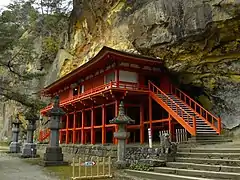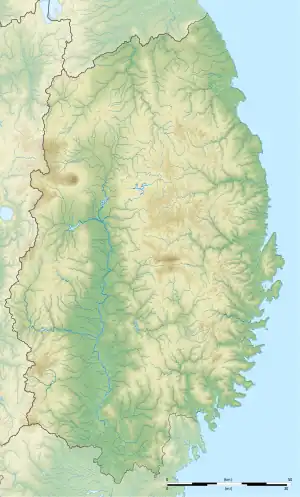| Takkoku-no-Iwaya | |
|---|---|
達谷窟 | |
 Takkoku no Iwaya | |
| Religion | |
| Affiliation | Buddhist |
| Deity | Bishamon-ten |
| Rite | Tendai |
| Status | functional |
| Location | |
| Country | Japan |
 Shown within Iwate Prefecture  Takkoku-no-Iwaya (Japan) | |
| Geographic coordinates | 38°58′08″N 141°03′29″E / 38.96901282°N 141.0581363°E |
| Architecture | |
| Founder | Sakanoue no Tamuramaro |
| Completed | 801 AD |
| Website | |
| Official website | |
Takkoku-no-Iwaya (達谷窟) is a Tendai sect Buddhist temple in Hiraizumi in southern Iwate Prefecture in the Tōhoku region of Japan. Its main image is a stone image of Bishamon-ten. Its formal name is the Takkoku no Iwaya Bishamon-do (達谷窟毘沙門堂). The grounds have been designated a National Historic Site since 2005[1]
Overview
Takkoku no Iwaya is located approximately six kilometers southwest of Hiraizumi, between the center of town and Genbikei ravine. The temple is built below an overhanging cliff, and incorporates a shallow cave containing a bas-relief statue of Bishamon-ten. In the Heian period, a large statue of Fudō Myōō (designated an Iwate Prefectural Cultural Property) and a bas-relief image of Buddha carved into the rock face were added.
The temple claims to have been founded by the Yamato Chinjufu-shōgun Sakanoue no Tamuramaro in 801 AD to commemorate his victory over the local Emishi tribes, who had used this cave as a fortification. The temple was described in the Kamakura period chronicle, Azuma Kagami.
The temple has burned down many times and its original form is unknown today; the current building dates from 1961 and was modeled after the famous Kiyomizu-dera in Kyoto.
Takkoku-no-Iwaya was included in the original 2006 nomination of "Hiraizumi - Cultural Landscape Associated with Pure Land Buddhist Cosmology”,[2] but was removed from the nomination after the failure to secure inscription in 2008; although there are continuing efforts to secure its inclusion through future extension.[3][4]
See also
References
- ↑ "達谷窟" [Takkoku-no-Iwaya]. Agency for Cultural Affairs. Retrieved 3 August 2012.
- ↑ 世界遺産の概要 [World Heritage Site: summary] (in Japanese). Iwate Prefecture. Archived from the original on 17 May 2006. Retrieved 3 August 2012.
- ↑ "Report on the 35th World Heritage Committee Session Decision Results for: "Hiraizumi- Temples, Gardens and Archaeological Sites Representing the Buddhist Pure Land"". Ministry of Education, Culture, Sports, Science and Technology. Archived from the original on 22 July 2011. Retrieved 3 August 2012.
- ↑ Corkill, Edan (18 June 2011). "Temple hopes for UNESCO nod and big cheer for Iwate". The Japan Times. Retrieved 3 August 2012.
- For an explanation of terms concerning Japanese Buddhism, Japanese Buddhist art, and Japanese Buddhist temple architecture, see the Glossary of Japanese Buddhism.
External links
![]() Media related to Takkoku-no-iwaya Bishamondo at Wikimedia Commons
Media related to Takkoku-no-iwaya Bishamondo at Wikimedia Commons